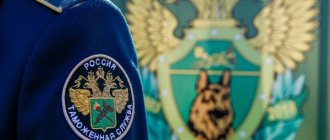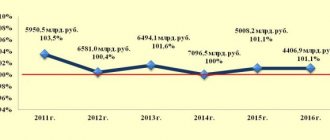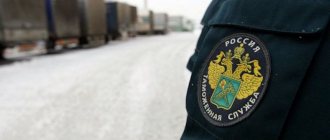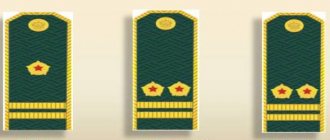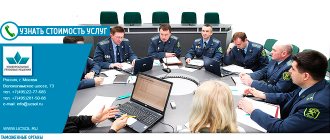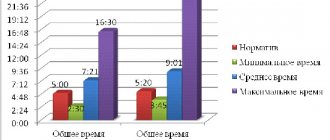Personnel policy of customs authorities
Solving the tasks of implementing customs policy aimed at ensuring the economic security of the country and protecting its economic interests, as well as the formation of the revenue side of the federal budget, entirely depends on the implementation of the unified personnel policy of the Federal Customs Service of the Russian Federation, in which personnel management takes priority positions.This is explained by the fact that shortcomings in matters of selection and objectivity in assessing the personal qualities of those recruited to serve in the customs authorities in recent years have led to negative phenomena: staff turnover, a decrease in executive discipline, official misconduct and corruption. For this reason, the image of the Russian customs officer in the eyes of the public was seriously damaged.
In these conditions, the most important task of the personnel services of the Russian customs authorities is to improve work with personnel.
3.4.1. Goals of the personnel policy of the Federal Customs Service of Russia
Personnel policy is understood as a system of theoretical views,
ideas, principles that determine the main directions of work with personnel,
its forms and methods.
1)
Goals of the personnel policy of the Federal Customs Service of Russia
Increasing the prestige and significance of the Russian customs officer in the public consciousness
Formation of a new type of customs officer
The main organizer and ideologist of the implementation of the personnel policy of the customs system for the near and long term is the organizational and structural commission of the Federal Customs Service of the Russian Federation (USC), whose tasks include:
- — streamlining the consideration of issues to improve the structure of customs authorities;
- — establishing the number of employees and employees;
- — creation, liquidation and reorganization of customs authorities [16].
3.4.2. Personnel service of customs authorities
In the context of administrative reform, civil service personnel management today acts as a holistic, independently functioning and organized management system, which, as a system, is subject to dynamic changes and complications due to a number of factors:
Factors
increasing complexity of management work in customs authorities; personnel is the most complex object of management
constant and drastic change in the value system of employees caused by general political and economic reforms of society
Their personnel services are called upon to manage the human resources potential of customs authorities.
The personnel service should be understood as a set of specialized structural units that implement personnel policy in an organization (customs) taking into account legislation based on the provisions of the Constitution of the Russian Federation.
Unites and coordinates work with human resources (including the activities of subordinate educational institutions of the system) by the Department of Civil Service and Personnel of the Federal Customs Service of the Russian Federation (UGOSK).
The specific structure of the personnel service, the distribution of personnel work between the structural divisions of the customs authorities, and in them - between responsible executors, depend on a number of factors, including: the volume of management work related to the number of personnel, the structural structure of the customs authority, etc. [22, p.44]
Directions of activity of the Department of Civil Service and Personnel of the Federal Customs Service of the Russian Federation
The activities of the personnel service are built in two directions: strategic and tactical.
The main structural unit for personnel management of customs authorities is the personnel service (personnel department), which is entrusted with various functions: for the reception of civil servants, employees and workers; organizing their training; professional development, promotion and, finally, dismissal.
The personnel service of the Far Eastern Customs Administration (FECU), for example, includes such structural units as:
- - Human Resources Department;
- — department of inspection and crime prevention;
- — personnel training department;
- — department of psychological work;
- — organizational and staffing department [16].
In customs, the structure of the personnel service is similar (with some exceptions).
The customs personnel department, like any structural unit, carries out its activities on the basis of the Regulations on the personnel department, agreed with the legal department and approved by the head of customs.
The personnel department of the Vladivostok customs, for example, consists of 7 people: the head of the department, three full-time positions of chief state inspectors and two senior state inspectors.
Based on the tasks facing the customs personnel department, responsibilities and functions between the chief and inspectors are distributed as follows:
Functions of HR department officials:
- — registration of personnel decisions of the head of customs, preparation of contracts (employment agreements) concluded with officials and customs employees;
- — interaction with structural divisions of customs, as well as with government bodies within the competence of the department;
- — organizing and ensuring certification of customs officials;
- — verification of documents and information provided by citizens upon entry into service (work) at customs;
- — preparation of proposals on the number of customs personnel within the wage fund of customs officials and employees;
- — monitoring compliance with prohibitions and restrictions established by the legislation of the Russian Federation when accepting citizens for service in customs;
- — ensuring compliance with organizational and staffing discipline, formation of staffing;
- — formation of a personnel reserve, organization of work with it and its effective use;
- — preparation and submission to a higher authority of materials regarding the assignment of special titles and class ranks to officials;
- — calculation of length of service and length of service in the state civil service for officials, preparation of relevant materials for consideration by the central commission of the Federal Customs Service of the Russian Federation for establishing length of service for officials;
- — ensuring timely preparation of documents in connection with appointment to a position and dismissal (dismissal);
- — preparation of materials related to extension of service;
- — providing consultations to officials on service issues and ensuring their legal protection.
Besides,
The functional responsibilities of HR department employees include:
- — consideration of letters, complaints, statements of organizations and citizens on personnel issues;
- — accounting of personal files, work books, registration and issuance of service certificates;
- — drawing up a vacation schedule, as well as documents related to their provision;
- — preparation of documents on health insurance for the appointment of pensions.
Based on the specificity of customs activities,
Human Resources Department:
- — provides customs officials and employees with access to work with secret documents;
- — conducts analytical work on materials received from law enforcement agencies;
- — organizes verification of personal data, information and documents provided by citizens when entering the civil service to the customs authorities;
- — organizes work on the formation, recording and storage of special inspection files.
Thus, the activities of the personnel service of customs authorities are determined by the personnel policy of the state, the competence of which includes everything related to the legal, social, information technology, financial, international legal aspects of the preparation and use of personnel potential, as the most important intellectual and professional resource of Russian society, called upon ensure the socio-economic development of the country, its competitiveness in the international division of labor.
3.4.3. Improving the management of human resources of customs authorities
Personnel support for the activities of the customs service today is built on the basis of the Development Concept of the customs authorities of the Russian Federation, which defines the main goals, objectives, principles and organizational, managerial, educational and socio-legal measures arising from them. [12]
Based on the Concept, a Strategy for Staffing Customs Authorities has been developed, which focuses on:
- — improving the quality of professional training, improving their knowledge and skills;
- — management practice;
- — increasing the efficiency of the remuneration system;
- — increasing the prestige of the customs officer profession;
- — creation of RTA branches in those federal districts where they do not exist.
One of the goals of the Federal Customs Service of the Russian Federation, as is known, is the formation of a new type of Russian customs officer,
distinguished not only by professionalism, but also by high moral and ethical qualities, culture, devotion to the interests of the state, and resistance to all illegal acts. Therefore, among the areas of transformation of the management system, the following can be distinguished:
3) Strengthening human resources
The key direction for improving organizational culture, including the creation of an effective system of educational work with personnel, the development of sustainable positive motivation for their work among customs officials, is to increase the prestige of the profession.
The most important components of the formation of highly qualified modern personnel potential of the Federal Customs Service of the Russian Federation are:
4) Development of the social sphere
The development of the social sphere of the Federal Customs Service provides for a significant improvement in material support and living conditions, social security of customs officials and members of their families, customs service pensioners and is aimed at ensuring the implementation of their rights and freedoms, decent social status and standard of living.
Achieving the social status of customs officers and the role they play in the life of the state has the ultimate goal of increasing the prestige of the customs service.
Notes: * —
after the federal law “On Law Enforcement Service of the Russian Federation” comes into force;
** - after the federal law “On the savings and mortgage system of housing for law enforcement officers” came into force.
Theory and practice
The fundamentals of personnel management are based not only on the objective laws of economic science, but also form on their basis an entire system of interests of all customs service employees. The most important management function in the customs authorities of the Russian Federation is creation, which increases the efficiency of the employees of this organization.
Let us list the basic laws of management, which fully express all the connections between subjects and objects of management, between ongoing processes inside and outside the organization:
- Unity of working elements and management. This law shows the constant relationship between the links of the organization from the ordinary employee to the highest government bodies.
- Law of proportionality. Expresses the importance of proportionality between the managing and managed subjects, the need for constant coordination of actions between all components of the organization.
- Centralization of management functions. Centralization of power does not yet mean tightening the management system for all departments. On the contrary, each of them should have its own degree of centralization, which is capable of ensuring the operation of individual structural units of the customs service at a decent level.
- The law of correlation between the subject and the object of management. This postulate regulates the provision of the necessary level of responsibility for the work done, both for managers and subordinates.
Under the influence of the above points, management principles in the field of TS work were also highlighted.
